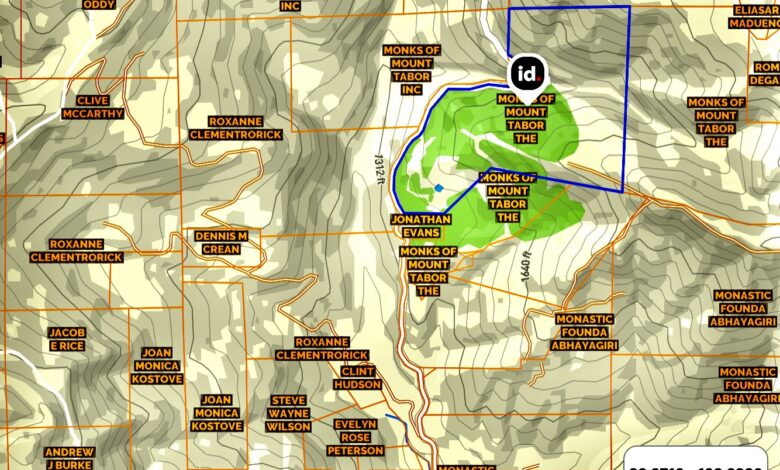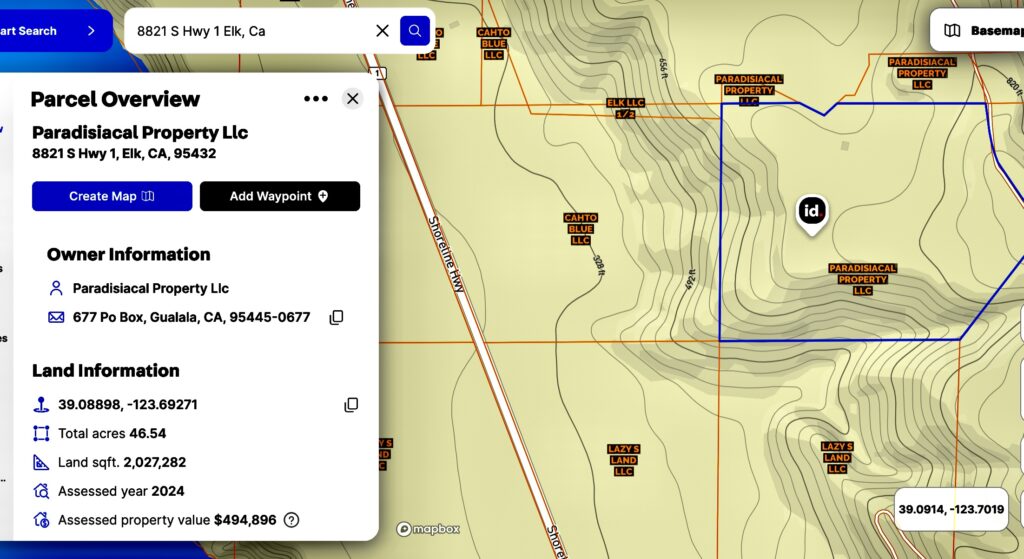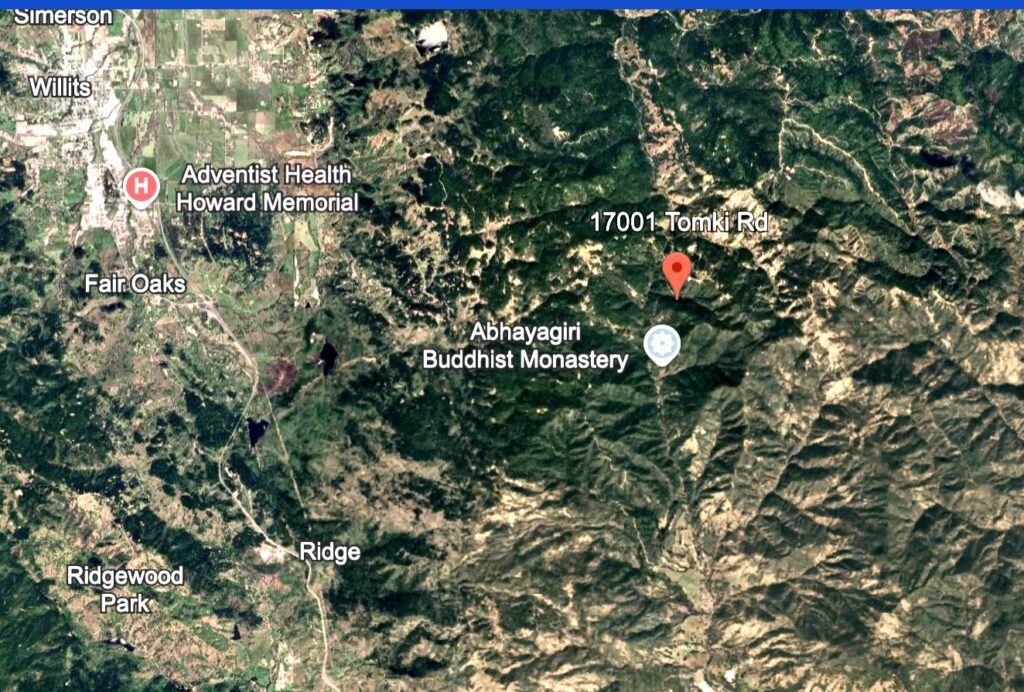Paradise in transition: vegan Canadians, Ukrainian monks, and a look at Mendocino’s rarely seen “heavens”

A vegan forest and ocean sanctuary in British Columbia has sold 46 acres of heaven in Elk—literally, in name and appearance.
The Salish Coast Land Marine and Wildlife Conservancy transferred approximately 47 acres at 8821 N. Highway 1 for $1.5 million. The buyer took title under a newly formed LLC called Paradisiacal Property—a name that translates, quite fittingly, to “a piece of paradise.”
The description holds up. Towering ocean cliffs rise just west of the parcel, offering some of the most spectacular coastal views anywhere along State Route 1. To the east, behind a stand of cypress, the land rolls gently into scenic hills and a small mountain. The property sits just south of Elk Creek, visible to anyone driving the highway below.
The buyer listed on the transfer documents is Christine Soanion Roshitsh, with a mailing address at PO Box 677, Gualala. The LLC address for Paradisiacal Property is 36855 Old Stage Road, Unit 677, also in Gualala. We were unable to reach any of the parties for comment.
The seller is no ordinary landholder. They’re the creators of the Woodwardia Biosphere Reserve, a 2,230-acre sanctuary on Texada Island in British Columbia’s Salish Sea. From their website: “Situated on the northwest coast of Texada Island in Canada’s west coast Salish Sea, 2,230-acre Woodwardia is a Biosphere Reserve in the making.” See More on Woowardia

Online videos show a landscape strikingly similar to Elk—towering bluffs, cathedral trees, and ocean drama. Had they been planning something here? A second sanctuary? A coastal twin?
Many arrive in this land of Paradise with big dreams. These sellers appear to have left town for good.
Woodwardia, by the way, is a fern—ancient, resilient, and quietly expansive. We reached out to the preserve but haven’t heard back.
In another view of heaven…
A Ukrainian Catholic monastery has acquired two skyward parcels in Redwood Valley, adding 51.5 acres to its Mendocino County holdings. The $712,000 purchase was made by the Monks of Mount Tabor, whose headquarters are in Michigan. The seller, Roxanne Clement-Rorick of Berkeley, signed the deal in Baltimore, Maryland.
The Monks of Mount Tabor follow Eastern Catholic traditions—distinct from, but spiritually aligned with, Roman Catholicism. Their Mendocino presence includes a monastery, retreat center, and dining hall nestled among the redwoods.
With this latest acquisition, their sanctuary grows—quietly, skyward.
The Eastern Catholic monks’ newly acquired parcels sit adjacent to several hundred acres held by the Monastic Foundation Abhayagiri—an entirely different spiritual tradition, located due east, both literally and culturally, from the Morris Reservoir in Willits.
The proximity is striking: two monastic communities, side by side in the redwoods, each with its own rhythm of silence, ritual, and retreat. One rooted in Eastern Catholic liturgy, the other in Theravāda Buddhist practice. Both quietly expanding their presence in Mendocino County’s highlands.
“Abhayagiri is a Theravadin Buddhist monastery of the Thai Forest Tradition in Redwood Valley, California. Its chief priorities are the teaching of Buddhist ethics, together with traditional concentration and insight meditation, as an effective way of completely uprooting suffering and discontent,” (from the Wikipedia.)
We hope to live long enough to visit these fascinating places and tell their stories firsthand—no Wikipedia required. This weekend offers a rare chance to do just that, with events both inland at the monastery and in Fort Bragg on Monday. Check their website for the full schedule.

Large swaths of Mendocino County are held by religious groups who rarely speak publicly. Among the best known—and most community-minded—are the City of Ten Thousand Buddhas near Ukiah and the Christ’s Church of the Golden Rule, whose members steward vast acreage between Ukiah and Willits. They’re key players in the local farming economy from Hopland north.
The Golden Rule Market was once a cornerstone of Fort Bragg’s business community, though we’re not certain if it was affiliated with the same group.
And that’s not to mention the many intentional communities and so-called “hippie communes”—most famously clustered around Albion, but quietly present throughout the county.
Linda attended a beautiful wedding this past weekend at Ten Mile Ranch—one of Mendocino County’s most enduring intentional families, rooted not in religion but in community.
The couple? Two longtime friends we lovingly call the “Hippie Kids,” ever since they first rolled up to our Fort Bragg book warehouse years ago in their brightly painted Hippie Bus. That moment marked the beginning of a friendship as colorful and heartfelt as their ride.
If you’re curious about these lands and their quiet stewards, we welcome your questions—and would gladly collaborate with a volunteer reporter for a non-prejudiced, boots-on-the-ground look
While we know many of the people behind Mendocino’s intentional communities, this story comes from public records—dug up by Frank Hartzell, not whispered over fences. Those records, along with real estate listings, reveal a startling trend: large swaths of Elk are for sale, north, south, and center. By percentage, it may be the most up-for-grabs coastal town in the county. And yet, the biggest mystery remains unsolved. Why did a tribal entity from the far eastern edge of California invest millions into luxury hotels and housing in Elk—only to shut it all down with two days’ notice? Residents were given more than the legally required time to vacate, but no explanation. We broke this story at Mendocinocoast.news, and we’re still watching, still asking, still hoping for answers.
